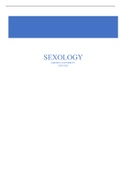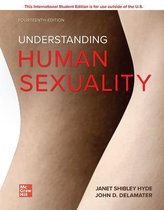SEXOLOGY
LEIDEN UNIVERSITY
2020-2021
, Hoorcollege 1 – What is sexology
What is sexology?
- Sexual health is the ability to sexually adapt and self-manage in the face of life’s
physical, psychological and social challenges.
- Sex doesn’t have something to do with gender.
- Sexology is the scientific interdisciplinary study of sexuality.
Bio-psycho-social model of sexuality
Sexual theories:
- Evolutionary theories: Evolution, Natural selection, parental investment
- Psychological theories: psycho-analytic, learning theories, social exchange theory and
cognitive theories.
- Critical theories: feminists’ theory. Gender as status and inequality, queer theory.
- Sociological theories: sexual script theory.
Libido = the subjective experience of physical need for sex.
The evolution of the study of sexology:
1. Freud: human behavior is motivated by libido (sex drive) and Thanatos (death).
o Pre-genital stages: oral, anal and phallic/oedipal stages (1-6 jaar)
o Latency stages (6-12 jaar)
o Genital stages (12 <)
2. Block: Sexualwissenschaft.
3. John Money: studied the development of gender identity in children. How your
parents behave influences if you show more or less male or female traits. Experiment
with boy twins.
4. Alfred Kinsey: founder of institute for sex research. Had marriage students that didn’t
know a lot about sexuality.
5. Masters and Johnson – psychophysiological studies. Measured the sexual responding.
Developed therapy for sexual problems.
Sensate therapy: Using behavioral exercises to restore the natural sexual response
Non-genital touching
Touching with genitals
Coitus position and movement
6. Helen singer Kaplan: She missed the Sexual desire phase. Integration of psycho-
dynamic orientation with behavioral therapy.
7. Susan Brownmiller: study on rape.
8. Shere Hite: penetration is not the best way for women to reach orgasm
9. David Buss (evolution theory): Differences between men (short term strategy) and
women (long term strategy).
10. Gagnon and Simon: Sexual scripting theory: sexual behavior is generated by scripts.
1
, Hoorcollege 2 Sexual dysfunctions in men
Male hypoactive sexual desire disorder
- They don’t feel like having sex. Persistently or recurrently deficient sexual fantasies
and desire for sexual activity.
- Prevalence: 0-6% (18-24), 41% (66-74)
- Treatment: testosterone supplements, sex counselling, combination
- Sex counselling: Change lifestyle, lose weight and exercise. Break the pattern of
avoidance behavior. Sensate focus – couple exercises: Focus on sexual responses and
erogenous zones. Cognitive restructuring. Couple therapy: communication exercises
Erectile disorder
- Marked difficulty in obtaining an erection during sexual activity, maintaining an
erection and marked decrease in rigidity
- Prevalence: 13%-21% (40-80 years), 2% younger than 40years
- Risk factors:
o Biological, medical and lifestyle: Trauma, pelvic surgery, neurological
diseases, hormonal diseases, alcohol, age, cardiovascular diseases,
hyperlipidemia, diabetes, smoking, side effects of medication.
o Psychological factors: Temporary normal episode related to a period of stress,
psychopathology, negative cognitive schema’s, fear of failure.
- Attentional bias: the attention focuses on the task and not on the sexual cognitions.
- Confirmation bias: this attention increases pressure to perform and decreases sexual
arousal.
- Treatment: Medication (Sildenafil (Viagra), tadalafil, vardenafil), Sex therapy
Ejaculate to fast
- Average ejaculation is 5.4 min.
- Etiology is unknown
- Treatment: Antidepressants, Dapoxetine and local anesthetic creams and sex therapy
including prohibition of intercourse, pelvic floor relaxation exercises, cognitive
therapy.
Delayed ejaculation
- Marked delay in ejaculation, Infrequency or absence of ejaculation on 75%-100% of
occasions, Causes: physical and psychogenic.
- Treatment: aim is to increase the sexual arousal. Look at what the goal is and finding a
treatment that works for that. (looking for sexual cues, masturbation training, etc.)
- Related problems:
o Retrograde ejaculation: Orgasm but no ejaculation through the urethral tract.
o Anhedonic ejaculation: Ejaculation but no orgasmic feeling
o Post orgasmic illness syndrome: Exceptional fatigue and exhaustion, Flu-like
symptoms, Irritable.
- Risk factors medicine: Antidepressants, antipsychotics, heroin use, alcohol and other
drugs.
2





